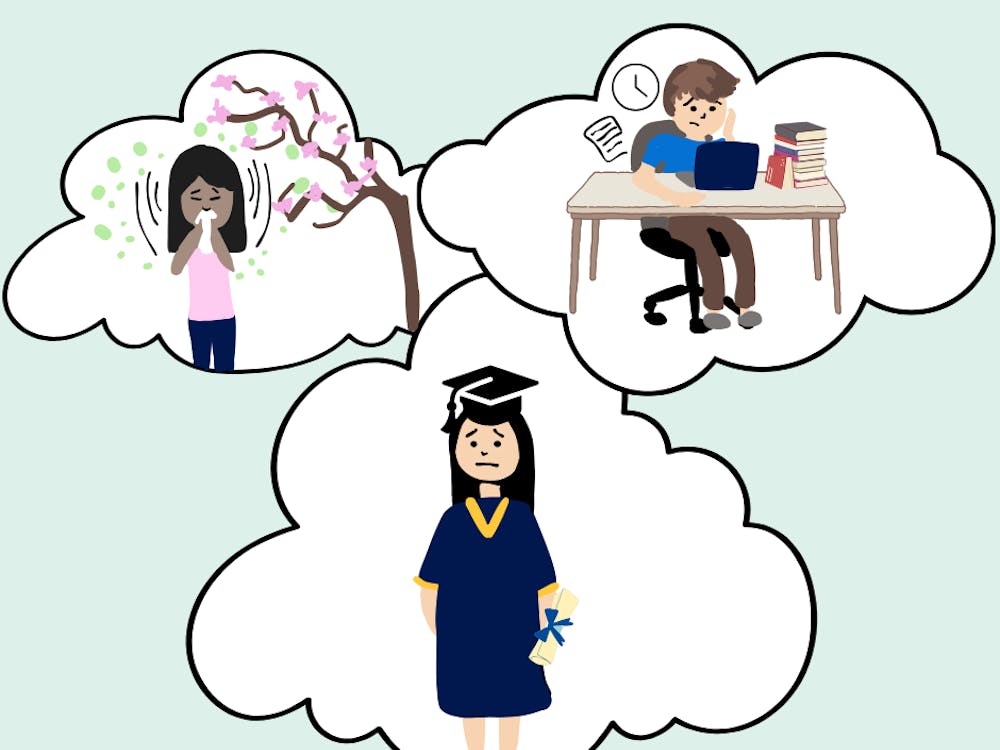中文版请点击此处
10. Read a book
Oftentimes we get so caught up in the chaos of the semester that we forget to take time for ourselves. While trying to maintain our academics and social life can be challenging at times, it is important to remember that taking time to relax and unwind can have a positive impact on your mood and mentality. Whenever you have those few spare minutes in your day, consider sitting down with a book. This helps take your mind off of the taxing, stressful things that occur in everyday life and allows you to decompress by getting lost in a story.
9. Check in with a friend
Whenever I find myself down and out or in a stressful, sad or anxious state, I like to check in with a friend. It is normal to feel disconnected or socially isolated from your friends, especially in college with a heavy workload, but maintaining friendships is so vital to our mental health. Whether this means walking across the hall and poking your head in your friend’s door, sending a quick text message or calling your friend on the phone for a few minutes, connecting with a person you trust and care about can brighten your day.
8. Do yoga
In between classes or after you finish an assignment, consider doing five to 10 minutes of yoga. Yoga has been proven to not only improve your strength, balance and flexibility, but it also relaxes you, helps you to sleep better and increases your mental and physical energy. If you get in the routine of doing even five minutes of yoga each day, you may find that you are better at managing your stress and have an increased sense of awareness and mindfulness.
7. Go for a walk
Especially during this time of year — when the leaves are changing and the colorful fall foliage covers Grounds — it’s such a relief to take 10 minutes out of your day to clear your mind and go for a walk. Whether you take a friend along or go alone, walking can improve and maintain your overall health, both physically and mentally. While most of us have to walk to class every day, there’s something different about intentionally choosing to go on a walk without a specific destination that benefits our mood and reduces stress and anxiety. With so many beautiful places to walk around Grounds, take advantage of the nature that surrounds you and make walking a part of your daily routine.
6. Journal
One way to deal with any overwhelming emotions you are experiencing is to take five minutes each day to journal and organize your thoughts. Not only is journaling a healthy tool for managing your stress or anxiety, but journaling also provides an opportunity to get in touch with yourself, identify the concerns and stressors in your life and improve your mood. Maintaining a daily journal is a great form of meditation that has positive implications for your mental health.
5. Craft
Whether you consider yourself artistic or not, painting, drawing or crafting can be a great way to support your emotional wellbeing and nurture your creative growth. These activities can help you practice mindfulness and lead to remarkable mental health benefits. Crafting forces you to focus on the present, and it allows you to free yourself from the worries, anxieties and intrusive thoughts of your everyday life.
4. Nap
If you're like me, you may reach a certain point in the day — normally early to mid-afternoon — when you feel mentally and physically exhausted. Whenever I experience this exhaustion, I find that taking a 10-minute nap can substantially improve my mood, energy and productivity. I used to have the perception that napping was a sign of idleness, but after incorporating napping into my day, I now know that this is false. Napping benefits your alertness, improves your focus, elevates your mood and improves your mental performance, which can all lead to a more productive and enjoyable day.
3. Listen to music
Listening to music has been proven to decrease your anxiety, improve your mood and facilitate opportunities for emotional expression. Whenever you have spare time during your day, or if you’re doing an activity that doesn't require your full attention, put your headphones in and listen to music. Music has a calming effect and can be a source of comfort for many as it lowers stress and makes you happier in general.
2. Clean and organize your space
Organizing spaces such as your room or closet can greatly heighten your level of focus and attention and can be a form of meditation. When you have a few extra minutes in your day, consider taking time to organize and declutter your space in order to feel more calm and gain control of your environment. This process can lead you to feel more inspired and satisfied.
1. Call your family
While in college, it can feel challenging to stay connected to those you love and care about, but remember your family members are only a phone call away! Whenever you are feeling sad or lonely, pick up the phone and call a family member — whether it be a parent, a sibling or a distant relative. This too can help you to feel more calm and can improve your stress levels.







